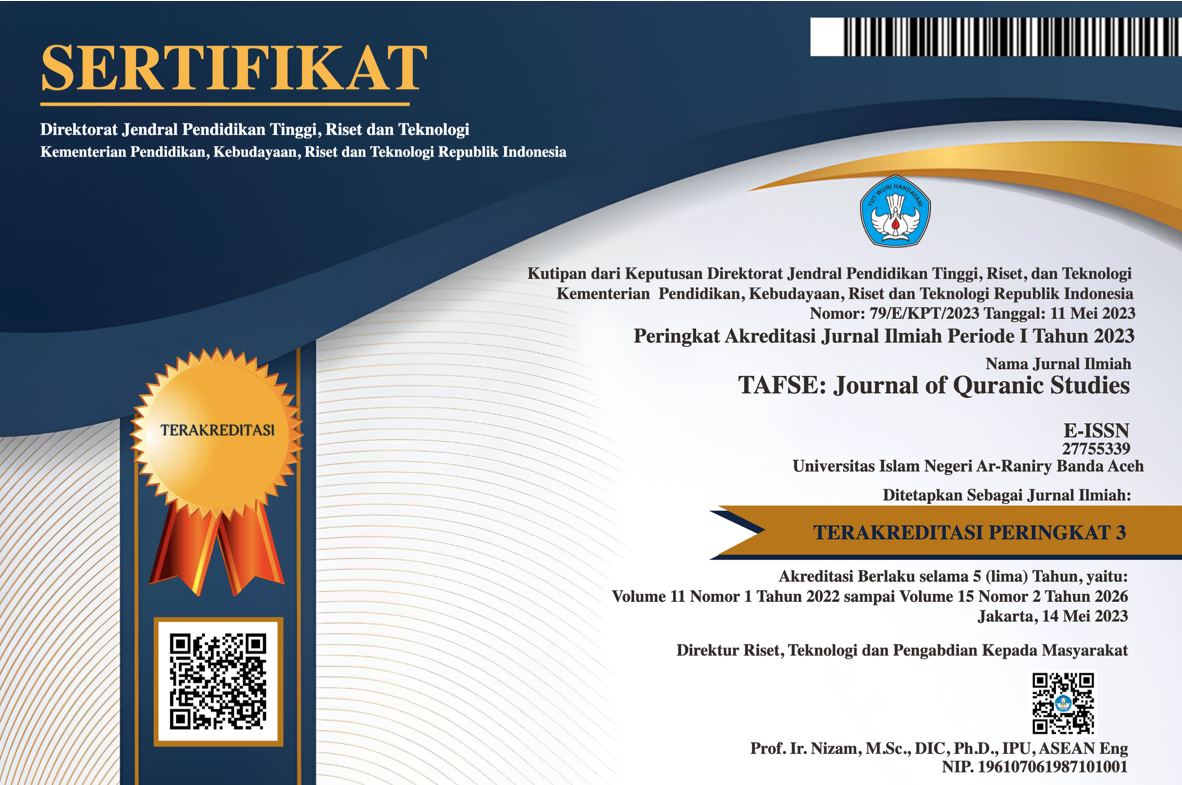Konsep Deradikalisasi Pemahaman Al-Qur’an Nasaruddin Umar
DOI:
https://doi.org/10.22373/tafse.v6i1.9206Keywords:
Deradikalisasi, Pemahaman, Al-Qur`anAbstract
Understanding of the Qur'an is growing in various circles. Starting from an understanding that presents Islamic values to an understanding that damages the image of the Qur'an and Islam itself. Like several verses related to war, they are taken exclusively as well as subjectively and textually which results in the emergence of an understanding that these verses are legitimacy and advice to fight using violence. This understanding is often categorized as a radical understanding. The deradicalization of the understanding of the Qur'an is an attempt to shift a radical understanding into a more moderate one. This paper aims to determine the concept and implications of deradicalization of Nasaruddin Umar's understanding of the interpretation of verses with the theme of war. This qualitative literature research is carried out by analyzing data and documents related to the discussion theme. The results showed that Nasaruddin Umar directed the understanding and interpretation of the Qur'an through a contextual approach. The implications of the concept are to give birth to a special concept of war in the perspective of the Qur'an. The Qur'an does legitimize the existence of war, but the legitimacy of the war has certain legal indications.
Pemahaman terhadap al-Qur`an semakin berkembang di berbagai kalangan. Mulai dari pemahaman yang mempresentasikan nilai-nilai keislaman hingga pemahaman yang merusak image al-Qur`an dan Islam sendiri. Seperti beberapa ayat yang terkait dengan peperangan, dipahami secara eksklusif maupun subjektif dan tekstual yang mengakibatkan munculnya pemahaman bahwa ayat-ayat tersebut sebagai legitimasi dan anjuran untuk berperang dengan menggunakan kekerasan. Pemahaman ini sering dikategorikan sebagai pemahaman yang radikal. Deradikalisasi pemahaman al-Qur`an merupakan upaya mengalihkan pemahaman yang radikal menjadi lebih moderat. Tulisan ini bertujuan untuk mengetahui konsep dan implikasi deradikalisasi pemahaman Nasaruddin Umar terhadap penafsiran ayat-ayat dengan tema peperangan. Kajian kepustakaan yang bersifat kualitatif ini dilakukan dengan menganalisa data dan dokumen yang terkait dengan tema bahasan. Hasil penelitian menunjukkan bahwa Nasaruddin Umar mengarahkan pemahaman dan interpretasi Alquran melalui pendekatan kontekstual. Implikasi dari konsep yang ditawarkan tersebut melahirkan konsep khusus mengenai peperangan dalam perspektif al-Qur’an. Al-Qur’an memang melegitimasi adanya peperangan akan tetapi tegitimasi terhadap peperangan tersebut memiliki indikasi hukum tertentu.
Downloads
References
Al-Qaththan, Manna’ Khalil. Studi Ilmu-Ilmu Al-Qur`an, Terj. Mudzakir As. Bogor: Pustaka Litera Antar Nusa, 2015.
Al-Zuhayli, Wahbah. Tafsir Al-Munīr Fi Al-‘Aqīdah Wa Al-Syāri‘ah Wa Al-Manhaj, Jilid 10. Beirut: Dar al-Fikr al-Mu‘aṣir, 1998.
Anwar, Rosihan. Ulum Al-Quran. Bandung: Pustaka Setia, 2007.
Ash-Shiddieqy, T. M. Hasbi. Sejarah Pengantar Ilmu Al-Qur`an Dan Tafsir. Jakarta: Bulan Bintang, 1980.
Azra, Azyumardi. Pergolakan Politik Islam Dari Fundamentalisme, Modernisme, Hingga Post Modernisme. Jakarta: Paramadina, 1996.
Katsir, Ibnu. Tafsir Al-Qur`an Al-‘Azhim, Juz 2. Jeddah: al-Haramain, n.d.
Umar, Nasaruddin. Deradikalisasi Pemahaman Al-Qur`an Dan Hadis. Jakarta: Elex Media Komputindo, 2014.
———. Teologi Jender. Jakarta: Pustaka Cicero, 2003.
Downloads
Published
Issue
Section
License
Authors who publish with this journal agree to the following terms:
- Authors retain copyright and grant the journal right of first publication with the work simultaneously licensed under a Creative Commons Attribution License (CC BY NC 4.0) that allows others to share the work with an acknowledgment of the work's authorship and initial publication in this journal.
- Authors are able to enter into separate, additional contractual arrangements for the non-exclusive distribution of the journal's published version of the work (e.g., post it to an institutional repository or publish it in a book), with an acknowledgment of its initial publication in this journal.
- Authors are permitted and encouraged to post their work online (e.g., in institutional repositories or on their website) prior to and during the submission process, as it can lead to productive exchanges, as well as earlier and greater citation of published work (See The Effect of Open Access).





